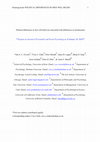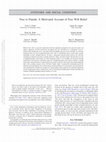Drafts by Cory J. Clark

Journal of Personality and Social Psychology, 2021
In fourteen studies, we tested whether political conservatives’ stronger free will beliefs were l... more In fourteen studies, we tested whether political conservatives’ stronger free will beliefs were linked to stronger and broader tendencies to moralize, and thus a greater motivation to assign blame. In Study 1 (meta-analysis of five studies, n=308,499) we show that conservatives have stronger tendencies to moralize than liberals, even for moralization measures containing zero political content (e.g., moral badness ratings of faces and personality traits). In Study 2, we show that conservatives report higher free will belief, and this is statistically mediated by the belief that people should be held morally responsible for their bad behavior (n=14,707). In Study 3, we show that political conservatism is associated with higher attributions of free will for specific events. Turning to experimental manipulations of our hypothesis, we show that: when conservatives and liberals see an action as equally wrong there is no difference in free will attributions (Study 4); when conservatives see an action as less wrong than liberals, they attribute less free will (Study 5); and specific perceptions of wrongness account for the relation between political ideology and free will attributions (Study 6a and 6b). Finally, we show that political conservatives and liberals even differentially attribute free will for the same action depending on who performed it (Studies 7a-d). Our results suggest political differences in free will belief are at least partly explicable by conservatives’ tendency to moralize, which strengthens motivation to justify blame with stronger belief in free will and personal accountability.
Papers by Cory J. Clark

Consciousness and cognition, 2017
Punishing wrongdoers is beneficial for group functioning, but can harm individual well-being. Bui... more Punishing wrongdoers is beneficial for group functioning, but can harm individual well-being. Building on research demonstrating that punitive motives underlie free will beliefs, we propose that free will beliefs help justify punitive impulses, thus alleviating the associated distress. In Study 1, trait-level punitiveness predicted heightened levels of anxiety only for free will skeptics. Study 2 found that higher state-level incarceration rates predicted higher mental health issue rates, only in states with citizens relatively skeptical about free will. In Study 3, participants who punished an unfair partner experienced greater distress than non-punishers, only when their partner did not have free choice. Studies 4 and 5 confirmed experimentally that punitive desires led to greater anxiety only when free will beliefs were undermined by an anti-free will argument. These results suggest that believing in free will permits holding immoral actors morally responsible, thus justifying pu...
Current Opinion in Psychology, 2015
Psychological science, Jan 10, 2014
If free-will beliefs support attributions of moral responsibility, then reducing these beliefs sh... more If free-will beliefs support attributions of moral responsibility, then reducing these beliefs should make people less retributive in their attitudes about punishment. Four studies tested this prediction using both measured and manipulated free-will beliefs. Study 1 found that people with weaker free-will beliefs endorsed less retributive, but not consequentialist, attitudes regarding punishment of criminals. Subsequent studies showed that learning about the neural bases of human behavior, through either lab-based manipulations or attendance at an undergraduate neuroscience course, reduced people's support for retributive punishment (Studies 2-4). These results illustrate that exposure to debates about free will and to scientific research on the neural basis of behavior may have consequences for attributions of moral responsibility.

Journal of Medicine and Philosophy, 2014
Rid and Wendler propose the development of a Patient Preference Predictor (PPP), an actuarial mod... more Rid and Wendler propose the development of a Patient Preference Predictor (PPP), an actuarial model for predicting incapacitated patient's life-sustaining treatment preferences across a wide range of end-of-life scenarios. An actuarial approach to end-of-life decision making has enormous potential, but transferring the logic of actuarial prediction to end-of-life decision making raises several conceptual complexities and logistical problems that need further consideration. Actuarial models have proven effective in targeted prediction tasks, but no evidence supports their effectiveness in the kind of broad spectrum prediction task that is the proposed goal of the PPP. We argue that a more focused approach, targeting specific medical conditions and generating treatment predictions based on the preferences of individuals with actual disease experience, is both more firmly grounded in past research and is a more prudent initial strategy for exploring the efficacy of actuarial prediction in end-of-life decision making.

Journal of Personality and Social Psychology, 2014
Belief in free will is a pervasive phenomenon that has important consequences for prosocial actio... more Belief in free will is a pervasive phenomenon that has important consequences for prosocial actions and punitive judgments, but little research has investigated why free will beliefs are so widespread. Across 5 studies using experimental, survey, and archival data and multiple measures of free will belief, we tested the hypothesis that a key factor promoting belief in free will is a fundamental desire to hold others morally responsible for their wrongful behaviors. In Study 1, participants reported greater belief in free will after considering an immoral action than a morally neutral one. Study 2 provided evidence that this effect was due to heightened punitive motivations. In a field experiment (Study 3), an ostensibly real classroom cheating incident led to increased free will beliefs, again due to heightened punitive motivations. In Study 4, reading about others' immoral behaviors reduced the perceived merit of anti-free-will research, thus demonstrating the effect with an indirect measure of free will belief. Finally, Study 5 examined this relationship outside the laboratory and found that the real-world prevalence of immoral behavior (as measured by crime and homicide rates) predicted free will belief on a country level. Taken together, these results provide a potential explanation for the strength and prevalence of belief in free will: It is functional for holding others morally responsible and facilitates justifiably punishing harmful members of society.
Free Will by Cory J. Clark
The Philosopher, 2020
This is the transcript of a debate on free will (published in The Philosopher, Vol. 108, No. 1). ... more This is the transcript of a debate on free will (published in The Philosopher, Vol. 108, No. 1). Contents: (1) “Free Will: Real or Illusion?” (by C. List); (2) “Why Free Will is Not Real” (by G. Caruso); (3) “The Social Sciences Have No Use for Undetermined Free Will” (by C. Clark); (4) “Replies to Caruso and Clark” (by C. List).










Uploads
Drafts by Cory J. Clark
Papers by Cory J. Clark
Free Will by Cory J. Clark